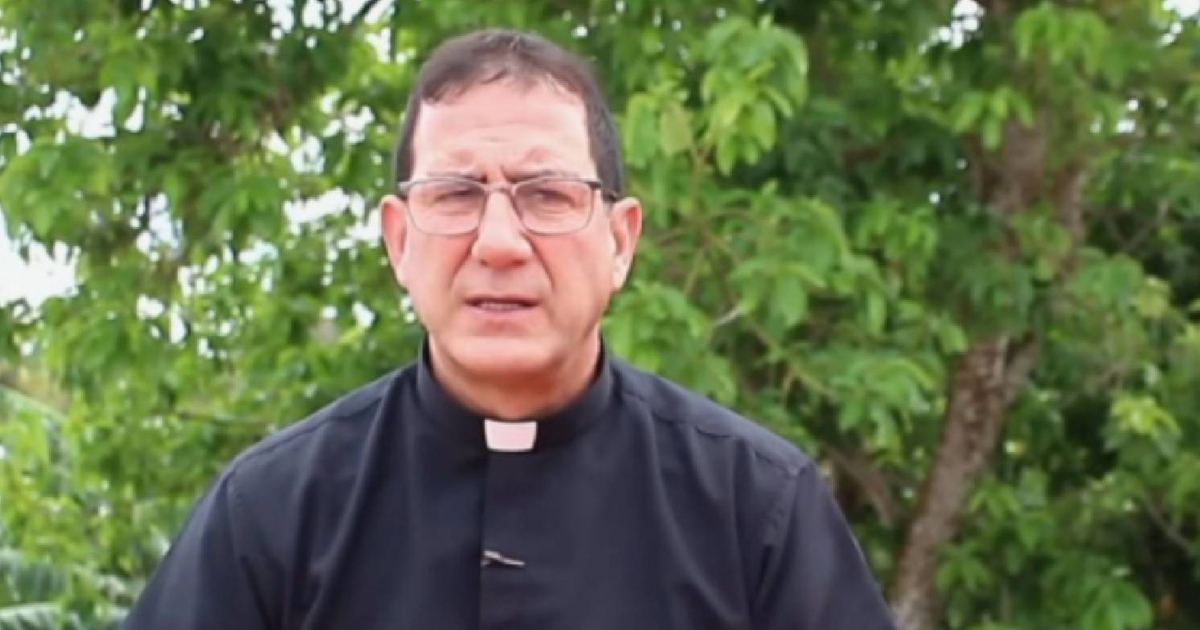The Cuban priest Alberto Reyes, from the diocese of Camagüey, shared one of his usual reflections on social media about the severe deterioration that Cuba is experiencing. Ironically, he used ideas from Fidel Castro's "History Will Absolve Me" to highlight the current tyranny and point a way forward for the Cuban people.
"Fidel relies on multiple authors who have condemned dictatorships and tyrannies and who defend the right to fight against them. We have already seen some of these authors, but he relies on many others," Reyes stated on his Facebook page.
Father Reyes, a staunch critic of the Castrista regime, points out the inconsistency between the ideas Fidel once defended and what he did once he came to power. As a young revolutionary, he "sold" himself as a follower of prominent figures in philosophy, literature, and religion, who validated the right of oppressed peoples to overthrow bad rulers. In the end, he became a dictator who imposed a brutal tyranny on his country.
Reyes' Reflection on Coherence
Reyes shared the full text of his reflection:
"I've been thinking... (LXXIX) by Alberto Reyes Pías
I've been thinking about the need for coherence between what one says and what one does II
In 'History Will Absolve Me,' Fidel relies on multiple authors who have condemned dictatorships and tyrannies and who defend the right to fight against them. We have already seen some of these authors, but he relies on many others.
He cites Martin Luther, who 'proclaimed that when a government degenerates into tyranny, violating laws, subjects are freed from the duty of obedience.' And Melanchthon, Luther's disciple, 'supports the right of resistance when governments become tyrants.'
He talks about the text 'Vindiciae contra tyrannos,' where 'it is openly proclaimed that resistance to governments when they oppress the people is legitimate.'
He mentions John Milton, who in 1649 wrote that 'political power resides in the people, who can appoint and remove kings, and have the right to depose tyrants.'
He quotes John Locke, who says that 'when the natural rights of man are violated, the people have the right and duty to suppress or change the government.'
He criticizes Jonathan Boucher and calls him 'reactionary' because he asserts that 'the right to revolution is a condemnable doctrine, derived from Lucifer, the father of rebellions.'
On the contrary, he praises the Declaration of Independence of the United States because 'it enshrined this right' - the right to rebel - in a 'beautiful paragraph' that says: 'We hold these truths to be self-evident, that all men are created equal; that they are endowed by their Creator with certain unalienable Rights, among these are Life, Liberty and the pursuit of Happiness; (...) that whenever any Form of Government becomes destructive of these ends, it is the Right of the People to alter or to abolish it, and to institute new Government, laying its foundation on such principles and organizing its powers in such form, as to them shall seem most likely to effect their Safety and Happiness.'
And he adds that 'the famous French Declaration of the Rights of Man bequeathed to future generations this principle: 'When the government violates the rights of the people, insurrection is for them the most sacred of rights and the most imperative of duties.'
Thus, Fidel energetically condemns both dictatorships and tyrannies. And what is a dictatorship? What is tyranny?
The dictionary says that dictatorship 'is a form of government concentrated in the hands of a single person or a group of people aligned with an ideology or movement, who possess absolute power and control the three branches of the state: legislative, executive, and judicial.'
The dictionary says that tyranny is 'a form of government where power is concentrated in a single person or group, exercised arbitrarily and unjustly, without respecting the rights of citizens, and using force to stay in power.'
Yes, neither dictatorships nor tyrannies will ever be capable of promoting the life, liberty, and happiness of the people. Therefore, it is no wonder that Fidel so vehemently advocates for the end of both, dictatorships and tyrannies."
Understanding Fidel Castro's Contradictions
To further comprehend the contradictions between Fidel Castro's early ideologies and his actions as a leader, here are some commonly asked questions:
What were the original ideas defended by Fidel Castro in "History Will Absolve Me"?
In "History Will Absolve Me," Fidel Castro relied on various authors who condemned dictatorships and tyrannies and defended the right to resist oppressive governments. He cited figures such as Martin Luther, John Locke, and the authors of the U.S. Declaration of Independence.
How did Fidel Castro's actions contradict his early ideologies?
Despite advocating for the overthrow of oppressive regimes, Fidel Castro himself became a dictator who imposed a brutal tyranny in Cuba, contradicting the very principles he once defended.
